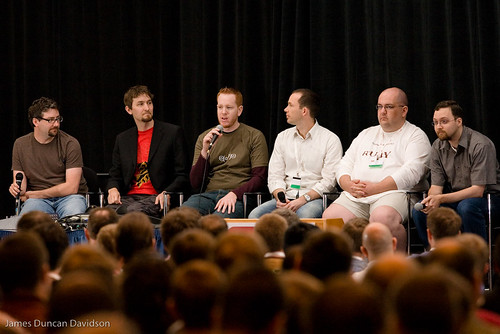On Saturday, I had the great pleasure of being up in front of several
hundred people with the following individuals on the the Business of
Rails
panel
at RailsConf.
 />
/>
[Photo by James Duncan Davidson]{.small}
Moderated by:
- Nathaniel Talbott, President, Terralien, Inc.
The Victims:
- Justin Gehtland, Founding Partner, Relevance
- Geoffrey Grosenbach, Topfunky
- Andre Lewis, Earthcode Studios
- Joe O’Brien, artisan, EdgeCase, LLC
- Robby Russell, Director, PLANET ARGON
Overall, the experience was fantastic. I really enjoyed the questions
that Nathaniel and the audience threw our direction, both during and
after the session. Throughout the remainder of the conference, people
would catch me and present complicated business questions to me and ask
for my input. I think that I even helped one guy make his final decision
about which job offer he was going to accept (btw, did you decide yet?).
It’s always great to share my experiences of leaving my last full-time
job (3+ years ago), moving to Rails exclusively (2+ years ago), how
Allison and I went from two people in an attic to
seven people in an attic in about a month… to having an office in
downtown Portland and clients around the globe. I’m also always happy to
share my not-so-happy experiences throughout the past few years as well.
Running a business is hard stuff as it comes with a whole lot of
responsibility, which can lead to stress. It was great to know that the
rest of the panel has had their difficult experiences. While Rails makes
everything feel easy… running a business is a whole different spectrum
of challenges. ;-)
At one point during the session the audience was asked, “How many of you
are considering starting your own business based on Ruby on Rails?”
The response?
Based off of my extremely scientific calculations (looking around the
room), I’d estimate that around 30-40% of the audience raised their
hands! Wow. It was fantastic to see that there was that much interest
in people starting venturing off onto their own. Imagine… a flood of
new companies, competing directly with us… and guess what? I think
that’s awesome! Awesome for Rails. Awesome for future startups. Awesome
for everyone!
Let’s face it. Rails isn’t going anywhere for a long time.
So, now that the conference is over, questions have begun to appear in
my email box. Thank you all for
writing. What if you could have a sounding board to throw questions to
on a regular basis? Unfortunately, our session only lasted a hour at
RailsConf and too many questions weren’t gotten to. Well, I’ve asked the
rest of those on the Business of Rails panel to join me on a google
group, titled, Ruby on Rails meets the Business
World.
If you’re looking to (A) start your own Rails-based business, (B)
already run your own Rails-based business, or (©) have business
experience that you’d like to share with those in camp A and B… then
join the community and
start some conversations.
Personally, I’m really looking forward to learning from you all and hope
that my experience of co-founding and leading PLANET
ARGON can be of benefit to all of you.
 />
/>
[Photo by James Duncan Davidson]{.small}





 {width=”500”
height=”333”}
{width=”500”
height=”333”} {width=”500”
height=”333”}
{width=”500”
height=”333”}


